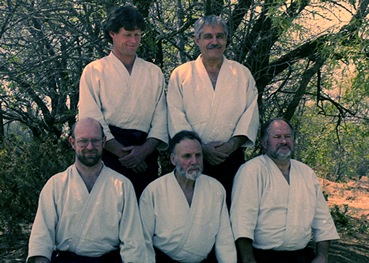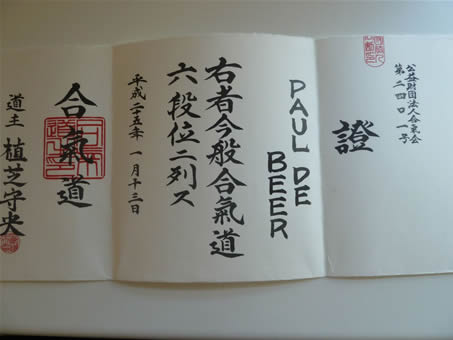
Related
|
|
We ceaselessly pray that fights should not occur. For this reason we strictly prohibit matches in Aikido. Aikido's spirit is that of loving attack and that of peaceful reconciliation. In this aim we bind and unite the opponents with the will power of love. By love we are able to purify others. Morihei Ueshiba
|
 THE INSTRUCTOR:
THE INSTRUCTOR:
De Beer Sensei is the Dojo-cho of TuksAikido and instructor in charge of the Pretoria Aikikai. He is ranked 6th Dan and carries the title of Jokyushidoin and Sekininsha within AFSA. Mr de Beer is a professional architect employed by the University of Pretoria. He is married and has two grownup children. He serves as advisor on both AFSA’s Technical Committee and grading panel and was a former president of AFSA. He has almost 40 years experience in Aikido and other Japanese martial arts and was a founder member of both the Aikido Federation of South Africa (AFSA) and the Confederation of South African Martial Arts (later MASA). He instructs at national seminars and some of his articles on Aikido has been published in leading SA and international magazines.
De Beer began his martial arts career at the age of 14. He started with Judo and switched to Karate in which he was later awarded 2nd Dan (Budo-ryu) at the age of 21. He achieved provincial colours in Karate and a teaching certificate in Goju-kai from the celebrated Yamaguchi Gogen (10th Dan).
He became interested in Aikido after his mentor and Karate sensei, the charismatic Richard Salmon, who later became internationally acclaimed as a conservationist and with whom he still maintains contact, introduced him to the writings of Tohei sensei and Ueshiba Kisshomaru Doshu. (Salmon sensei had met and trained with O’Sensei Ueshiba in the late 60’s during a special study tour to Japan)
De Beer’s training started under Spartan conditions at the Bloemfontein General Hospital’s Physiotherapy Department in 1976. He took the classes and later trained a regular class at the Bethlehem orphanage. His main training partner was his close friend, Fritz Zöllner. The training was spirited, but extremely hard and physical. Without any prior knowledge or graded teacher the group reverted heavily on the aikido books in their possession.
During December 1977 the dojos of Durban, Bloemfontein and Cape Town joined forces under Dave Buchanan and founded the Aikido Federation of South Africa (AFSA). Paul de Beer, Fritz Zöllner, Joss Niehaus, Arnie Gould, Max Widdan and Christopher McQuaid were amongst the pioneering fathers.

De Beer then moved to Pretoria where he started a dojo in Sunnyside (1979) and concurrently later founded the University of Pretoria dojo (1982). The Sunnyside dojo later moved to Meyerspark, amalgamated with the Pretoria Technical College and separated again to establish itself as the central dojo of the Pretoria Aikikai in Hatfield. It finally moved to its current location at the University of Pretoria, where it goes under the name of TuksAikido. Jos Niehaus, Paul de Beer, Fritz Zöllner and Adolfo Braga were the leading figures in South African Aikido at the time.
Chris Smart Sensei (3rd Dan) emigrated to South Africa in 1981 and De Beer was elected to take charge as combined Chairman-Secretary-Treasurer of AFSA.
The AFSA Chairmanship was succeeded in the following order since it was founded in 1977: David Buchanan, Paul de Beer, Adolfo Braga, Paul de Beer, Jos Niehaus, Fritz Zöllner,
Elroy Goliath, Colin Beyers, Giuseppe Soffietti.
The majority of the current AFSA structures were established under the direction of Smart Sensei and with Paul’s help. Together they authored the first AFSA training manual, -grading syllabus, -grading register and “Aiki News” publication. He then later introduced the AFSA card system, video library and helped Human sensei, his student at the time, with the drafting of the 1st AFSA Constitution. They also launched AFSA’s first website.
Sensei was fortunate to befriend and study under the constant guidance of top international instructors with direct relationship with the Hombu dojo ever since AFSA was established. They played a dominant role in his personal development as well as the future progress of AFSA.
They are named below in chronological order:
M Kanetsuka (7th Dan), C Smart (3rd Dan), K Cottier (7th Dan), G Veneri (6th Dan), F Martufi (6th Dan), M Minegishi (7th Dan), Y Fujimoto (8th Dan), I Kubota (8th Dan)
He has travelled extensively and attended various international stages, besides AFSA’s regular national courses. In 2004 he was invited on a month long study tour to Japan with Minegishi sensei and 3 other SA instructors. During this time they trained with 18 prominent instructors at different locations throughout Japan. Together they experienced the culture of Japan, visited prominent historical sites and befriended lots of people. The highlight was their visit to Hombu dojo and the Iwama Shrine.

Previous visits included Britain (1986), Reunion (2002), Italy (2003), China and Hong Kong (2006), a 2nd visit to Japan (2008) and Russia (2010). During his visits he met and trained, amongst others, under the following high-ranking masters:
Ueshiba Moriteru (Doshu), H Tada (9th Dan), M Fujita (8th Dan), S Masuda (8th Dan), N Tamura (8th Dan), S Endo (8th Dan), H Osawa (7th Dan), M Yasuno (7th Dan), C Tissier (7th Dan), T Ezra (7th Dan), T Smibert (7th Dan), Ueshiba Mitsuteru (Waka sensei)
De Beer Sensei puts a high premium on the traditional values of Bushido and Budo as an art that emphasizes personal development. He sees Aikido as a reflection of the macrocosm and strongly advocates the symbiosis between Aikido and nature. He encourages his students to be practical, to care for the environment, to conserve universal values and to make the world a safe and better place for all.
The University presented de Beer Sensei with a honorary award for Aikido in 1991 and again in 2006. He has also been recognised by the South African Karate and Martial Arts Hall of Fame.